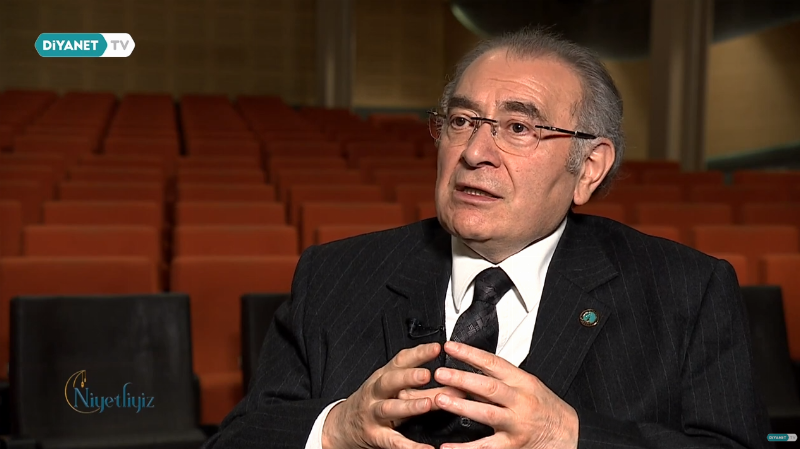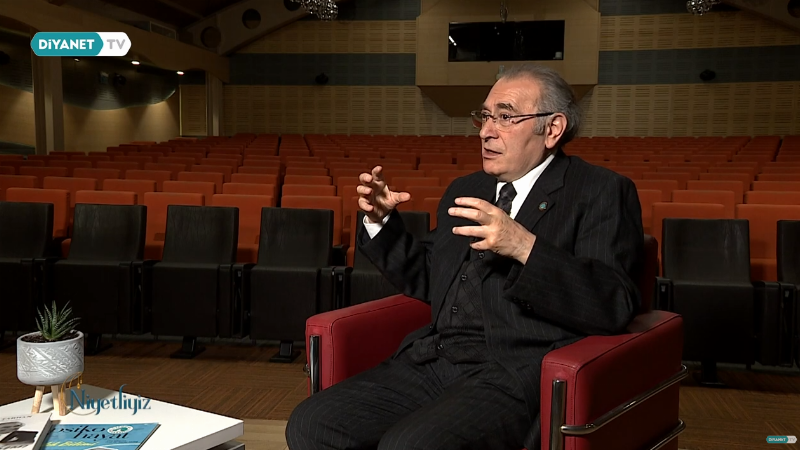To share the joy and culture of Ramadan, the "Niyetliyiz" (We are Fasting) program, which hosts valuable guests, meets with its audience on Diyanet TV during the month of Ramadan. President of Üsküdar University, Psychiatrist Prof. Nevzat Tarhan, who was a guest of the program, made remarkable statements about the importance of Ramadan. Stating that skills such as delay of gratification and endurance training gained through psychological trainings will be acquired naturally by fasting in the month of Ramadan, Tarhan noted that Anatolian wisdom and Islam offer these skills by combining them with worship.
“Good assumption is essential, bad assumption is exceptional"
Emphasizing the importance of acting with good intentions in life, Tarhan said that great transformations will occur from the combination of good assumption and good intention. Tarhan said that "The feeling of doing random acts of kindness is very important and it is a sign of goodwill. Being well-intentioned and ill-intentioned is also a bit about being paranoid. Paranoid people, that is, skeptical, doubtful people are often malicious. For example, let's say a paranoid father… His child brought him a gift, and the father says; 'Why did you bring it, what favor will you ask in return?'. Thus, the child does not bring another gift, the child is hurt, traumatized and begins to give their father cold shoulder. If only their father acted with the rule of wishful thinking, however, he acted with the rule of bad assumption instead. Well, good assumption is essential and bad assumption is the exception in life. Pure-minded people look at things with good intentions. Good thinking is essential in primary, close relationships. If you have always seen bad in a person and you are sure that you know that they are hostile, you approach people with bad assumptions. For this reason, the rule of good thinking also forms the basis of good faith. When good thinking is combined with good intentions, a fascinating and varied transformational and transformative effect emerges. In fact, I have experienced examples of this, so we can say that it is like an invisible hand helps in such situations.".
"Our intentions allow us to perceive events and take the right position"
Drawing attention to the importance of the intention related to Ramadan, Tarhan said, "fasting with an intention and unintentional fasting are different. When you have intention to fast, the brain prepares itself since you will fast and be hungry all day. The brain secretes chemicals related to hunger and satiety. The first 2-3 days the body has difficulty in adapting. After 2-3 days, it does not secrete hunger hormones at noon, and it thinks that it is the intention. What is happening here is that you can be comfortable at the evenings without feeling hungry after the body adapts. However, if you are fasting under the influence of society, if you are fasting for the sake of others, that fast discomforts. If you keep it sincerely, you will spend the fast very comfortably. For this reason, intention is very effective in improving a person’s behavior and self-development, and intention has a great counterpart in neuroscience. Intended behavior also creates the power of persuasion. Our intentions allow us to perceive things correctly, take the right position, and make the right connections. If our intentions are bad, we take the wrong position. We establish false bonds of meaning, we react incorrectly. Therefore, we push away others. It is the intention that brings out good assumption and bad assumption. Let's take care of our intentions for this reason.".
We miss the Ramadan climate in our childhood because the evil decreased in those times"
Tarhan, who shared his remarks on the Ramadan period he spent in his childhood, highlighted the effect of neighborhood and family culture on children. Tarhan stated that "Ramadan in childhood often coincided with the winter periods. During Ramadan, all the children in the neighborhood would gather. Every evening we used to go to a mosque for tarawih prayer. We were walking around all over Merzifon, there were like 30 mosques. We, as the children of the neighborhood, used to go to the mosque without our parents’ advice. I was very impressed by the culture of this neighborhood. The influence of this culture on the child, and the family is very important here now. For example, my father used to come home immediately when his work was done during the Raman. He never thought that he would come and later hang out for coffee in cafes after that. There was such a warm family atmosphere, warm relationships. There was contact with our grandparents, who would make Ramadan more sympathetic. They always say that the old Ramadan is like this, or in fact, when you say the old Ramadan, you do not mean the Ramadan of the old times, you mean the Ramadan of your own childhood. We miss the climate of Ramadan. When it is Ramadan, we are now fasting at home and in the family, and we are not patient. The mother is not tolerant, the father is not tolerant… And, the people in environment are not tolerant either. Thus, the house becomes more adorable. Therefore, the reason why Ramadan is loved in childhood is that the evil decreases during Ramadan. The tone of voice at home does not rise so high. There is an increase in warm relations, an increase in benevolence, that is, a spiritual atmosphere created by Ramadan. Due to that atmosphere, we love Ramadan in our childhood, but it depends on the family. If we do not have a warm family environment that affects our children right now, our children will disappear. At the moment, the family does not transfer culture, social media does. Social media can be used positively during Ramadan. Social media is a technology. If it is used in a good way, it makes good things do and if it is used in the wrong direction, it makes you do wrong things. Social media itself is impartial. It is not right to judge and accuse it in a way like this. It is important to be able to use it for good purposes.".
"Transferring spiritual and high values to the young generation is not possible through advice but through representation"
Emphasizing the need to be good role models in order to make the young generation like Ramadan, spiritual and high values, Tarhan underlined that it is necessary to use the method of representation, not advice. Tarhan said, "On the day of the earthquake, all the university students and the student clubs, who were called that generation Z and questioned it like that, worked incredibly that they collected packages day and night, they used their pocket money to buy water, diapers. They collected packages and taped them. They all worked and sent them to that region. In other words, I said that it is wrong to approach young people in such a critical way. Young people do what is necessary for their youth, but then when they see the truth, they live in the nature of acceptance. For this reason, we should not approach this young generation with prejudice. With the earthquake, Türkiye gave an exam, but the real youth gave that exam. They ran to that area. There are students who went to that area, they went to the region spontaneously. If we want to endear Ramadan to youth, let us first live in accordance with its meaning. In Ramadan, let us be more benevolent, let us say better words, let us set a better example. If we can be good role models, it will develop and activate the good in the other party. Bad behavior activates the evils of the other party. In order for children to approach Ramadan with love, it is important that we can make our Ramadan home a warm, relaxing, safe environment and a safe space. If we do that, the child will love Ramadan, and the child will love the house. When one loves home, that person loves what happens in the house. That child loves Ramadan, so it is not possible to come across it and give such a 3-hour conference on Ramadan. With the language of the state, with the language of behavior, that is, with the observation of the beauties of Ramadan, young people love Ramadan. Man needs solace. It is the spiritual and high values that will meet all this. These values are needed by the younger generation. It is necessary to be able to convey them, and that is through representation, not by advising.".
"In Ramadan, you gain delay of gratification ability and endurance training"
Stating that some of the skills gained through psychological trainings and many modules will be acquired naturally by fasting in the month of Ramadan, Tarhan said that Anatolian wisdom and Islam combine these skills with worship. Tarhan said that "The Ramadan period is of course a time of spiritual trade. There are periods of such profitable trade, fairs and discounts. In Ramadan, like such a spiritual fair, there are discounts, all spiritual trade comes out but this is an investment for the afterlife. People gain the ability to manage emotions during this period. For example, the most important thing is that you gain the ability to delay gratification during Ramadan. You cannot eat the food in front of you, you postpone your pleasures, not only that, but you postpone many other pleasures as well. The second is endurance training. Psychological resilience training is provided for endurance training. There are modules of endurance training, a lot of sessions are done to teach these modules. A young person who fasts during Ramadan enters a kind of endurance training. They postpone some of his pleasures for a higher purpose and develops stamina against it. These are the most important social and emotional skills in a person's life. A young person who does not learn these skills is impulsive, acts with feelings, acts without thinking about the end, makes sudden decisions and always makes mistakes. However, a person needs to act by thinking about the end and to be aware of the loss and to be in the perception of loss and to learn to make profit-loss analysis. These are actually referred to as a kind of exquisite upbringing in our culture. The real freedom is not to live according to one's mind, but the real freedom is to be free from one's desires and impulses. To be able to put a voice into their inner impulses. The real wrestler is not the one who defeats someone else, but the one who defeats himself, right? Ramadan is a good opportunity to teach this. Anatolian wisdom and our religion provide this by combining it with worship. It gives as a spiritual trade. Ramadan is a month of spiritual long-term investment. Spiritual trade is the month where an investment is made for afterlife. Life is not only the life of the world; the world is the parenthesis opened to the life of human. We are going through an exam, and when it comes to the end, we will go with whatever we have filled our bag, we should not forget this.".
Üsküdar News Agency (ÜNA)



